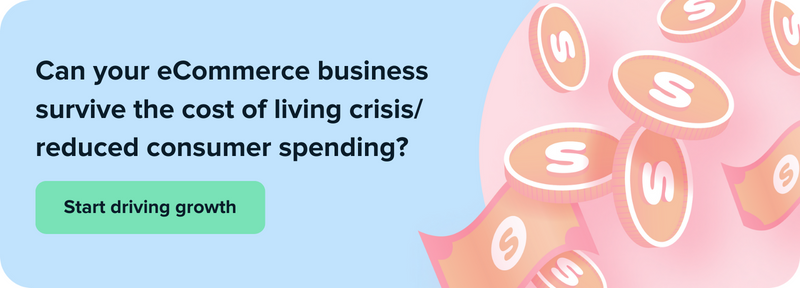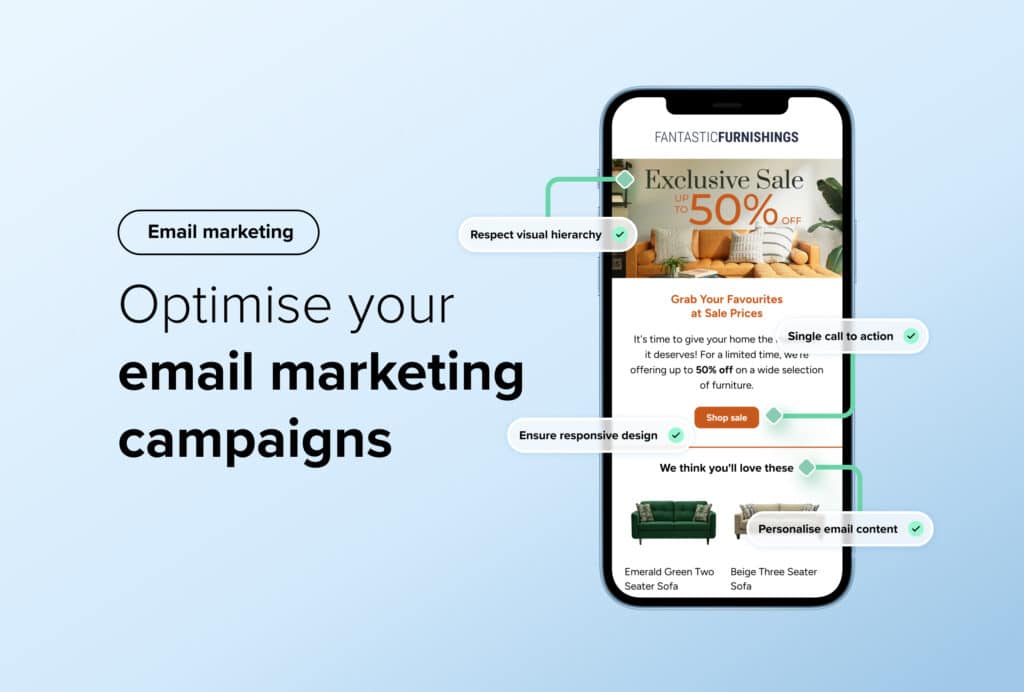Your eCommerce Site is Using Social Proof All Wrong
By Bethany Llewellyn • Last updated: Wednesday Apr 24th, 2024

In the current economic climate where consumers are more hesitant to spend money, eCommerce social proof is crucial for eCommerce businesses that are looking to improve conversion rates.
To gain a competitive advantage, online retailers should now think of social proof as a key part of their eCommerce strategy, not just another feature on their website.
What is social proof and why do you need to use it?
Social proof is a term that describes the influence that an individual or group of people can have on the perception of a situation.
It’s commonly used in marketing when businesses are trying to convince customers to buy their products or services. There are various types of social proof, all of which contribute to the credibility of your brand, website or products, including:
- Product reviews.
- Customer testimonials.
- Star ratings.
- Case studies.
- Celebrity endorsements.
- User recommendations.
But why does it work so well? It’s a psychological effect — these strategies make potential buyers feel more confident about their purchases.
And, in the current period of financial instability where shoppers are more carefully considering how they spend their money, they’re looking for extra reassurance before committing to an item or a brand.
Suggested reading: For more information on what social proof is and how it works to increase conversions, check out our blog, Use Social Proof to Increase eCommerce Conversions.
What social proof can do for your eCommerce business
Your eCommerce store has a lot of competition. Not only are there more online retailers than ever, customers have less spending power — so you’re dealing with a saturated market and reduced demand. So, how do you make yours stand out?
When it comes to using social proof on your website, there are many options available to you and it’s crucial to choose the solution that’s right for your business and customers.
Incorporating forms of social proof as a core part of your marketing strategy will help to ensure you maximise every opportunity for a conversion.
1. Increase buyer confidence
Social proof is vital to increasing buyer confidence, especially for new visitors.
For the best results, you should put yourself in the shoes of a consumer and ask the right questions. For example, when a consumer intends to purchase a product, what is the first thing they will do?
They’ll likely be looking for information such as how much it costs, how it fits and the materials or ingredients. Providing this information in product descriptions will go a long way in helping to eliminate any queries or uncertainties a consumer may have, but getting this information directly from fellow consumers in the form of reviews can further encourage users to commit to a purchase
Nowadays, people don’t only trust word-of-mouth from their friends and family, they also place a lot of value in online reviews and ratings from strangers on the internet. If other customers deem the item a worthy investment or provide additional product details that reinforce your descriptions, they’ll be more inclined to buy it.
Business Today reported on a survey in 2018 that found that 20% of all products sold on eCommerce sites are counterfeit.1 That number can only have gone up, and it explains why your customers are less trusting of items you sell. By publishing reviews, you reassure them of the quality of the product, and ensure they have a much more enjoyable onsite experience.
To take it a step further and increase buyer confidence for those online shoppers who need a final push to commit to a purchase, you can utilise user-generated content on your site.
Some ways you can encourage customer participation in your marketing strategy to encourage UGC include:
- Sharing photos of real customers using your products.
- Offering incentives or competitions for customers who post their own photos.
- Utilising social links in your email signatures.
Some retailers even feature Instagram posts from happy customers, providing the incentive of increased exposure to your customers while simultaneously promoting your brand.
Publishing positive reviews and weaving user-generated content into your social strategy will help to emulate the feeling of being in a brick-and-mortar store and seeing someone else buy a product, increasing buyer confidence and driving sales.
Pro tip: When using user-generated content to encourage users to purchase from you, it’s best to utilise positive reviews that show excellent customer experiences as well as product satisfaction.
This gives users another opportunity to see other people’s onions on these items and your business before making a purchase decision.
2. Improve customer relationships
Just as showcasing social proof can be used to influence purchases, requesting feedback and reviews from your customers to use for this content can be beneficial for your business in itself.
Asking your shoppers for reviews and ratings on their purchases improves your relationship with established customers by showing you care about how they found a product and value their contribution to improving your brand.
You could even reward them for their feedback by offering free delivery or a discount on their next purchase to reintroduce them into the buying funnel.
This stronger relationship with your customers will also help you:
- Boost customer loyalty: Showing you value customer feedback improves your bond with shoppers and makes them more likely to consider and recommend your brand in the future.
- Secure repeat purchases: A customer that feels valued is more likely to return to your site for future purchases than head to a competitor.
- Create social advocates: A stronger relationship with your customers will make them more likely to advocate for your brand on their own social media of their own accord, creating even more forms of social proof.
- Counteract rising customer acquisition costs: As it gets more expensive to acquire new customers, building relationships with your existing customers will prove a cost-effective way to secure further sales.
The relationship you build with your customer base can be one of the most valuable assets to your business. These customers come to know and love your brand, your values and your company stance, and will often also share their experience offline with their friends and family through word of mouth.
In return, you can secure various potential customers from one customer who purchased with you.
Suggested reading: To improve your customer experience and secure more sales and positive reviews, read our article How to Improve the eCommerce Customer Experience to Drive Sales.
3. Boost your AOV
The confidence users feel in purchasing with your brand will greatly influence their decision to add more products to their basket.
Using Digital Assistant, you can use dynamic messaging campaigns to highlight key information on-site, showcase reviews or testimonials, or highlight the popularity of a product to support those visitors who are hesitant about making a purchase.
By injecting the opinions of happy customers throughout a shopper’s path to purchase, you can give them the confidence to add more items to their basket.
Pro tip: Support this social proofing strategy by suggesting relevant items on product pages using tools like Recommendations to further increase your average order value.
Final thoughts
Social proof works to help eCommerce businesses convert more shoppers into buyers.
Depending on your target audience and what you wish to accomplish from your marketing efforts, social proof might manifest as:
- User reviews.
- Social media posts.
- Celebrity endorsements.
- Earned media.
No matter your goals, though, social proof can be used in a variety of ways to increase conversions, boost shopper confidence and grow your business.
1 20% of the products sold on e-commerce portals fake, says survey | Business Today
See how Salesfire can help you optimise your product discovery experience, email one of our experts at enquiries@salesfire.com or book a free demo of our personalisation tools.





